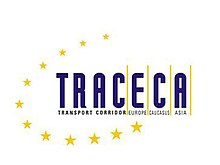TRACECA (acronym: Transport Corridor Europe-Caucasus-Asia) is an international transport programme involving the European Union and 12 member states of the Eastern European, Caucasus, and Central Asian region.[1] The programme aim is to strengthen economic relations, trade, and transport in the regions of the Black Sea basin, South Caucasus, and Central Asia. It has a permanent Secretariat, originally financed by the European Commission, in Baku, Azerbaijan, and a regional office in Odesa, Ukraine. Since 2009, the organization has been entirely financed by member countries.
 | |
| Formation | 1993 |
|---|---|
| Type | Economic co-operation organization |
| Location | |
Membership | 12 plus 27 European Union members |
| Website | |
TRACECA was established in May 1993 in Brussels, upon the signing of a Multilateral Agreement on International Transport for the development of transport initiatives (including the establishment and development of a road corridor) between the EU member states, Eastern European, Caucasus and Central Asian countries. The programme supports the political and economic independence of former Soviet Union republics through enhancing their access to European and global markets through road, rail and sea.[2] The objectives of TRACECA were underlined by the Baku Initiative of 2004,[3] followed by a further ministerial conference in Sofia, Bulgaria, in 2006.
The following states currently participate in the TRACECA program:[1]
Plus the 27 member states of the
Iran officially joined TRACECA in 2009 after their request was accepted during a meeting held in Brussels.[4] However, technical assistance related to the project has not been provided to Iran since 2010 due to EU sanctions.
In 1996, Mongolia was granted observer status.[5]
In 2009, Lithuania was granted observer status.[5]
In July 2016, Greece announced they are considering joining TRACECA activities as an observer.[6] In March 2018, Greece was granted observer status during a meeting held in Yerevan.[5]
The Permanent Secretariat of TRACECA was established in March 2000 in Baku, and inaugurated on February 21, 2001, with the participation of the then President of Azerbaijan Heydar Aliyev, together with Javier Solana, Christopher Patten, Anna Lind. The Secretary-General is a chief executive officer of the Permanent Secretariat. The first Secretary-General elected by the Intergovernmental Commission was a representative of Georgia, ambassador Zviad Kvachantiradze.
The current Secretary-General is Mircea Ciopraga, appointed by the Intergovernmental Commission in January 2015.
| No. | Secretary-General | Dates in office | Country of origin | Ref |
|---|---|---|---|---|
| 1 | Zviad Kvachantiradze | 2000–2002 | Georgia | [7] |
| 2 | Abdurashid Tagirov | 2002–2003 | Uzbekistan | |
| 3 | Lyudmila Trenkova | 2003–2006 | Bulgaria | |
| 4 | Rustan Jenalinov | 2006–2009 | Kazakhstan | |
| 5 | Zhantoro Satybaldiyev | 2009–2011 | Kyrgyzstan | |
| 6 | Eduard Biriucov | 2011–2014 | Moldova | |
| 7 | Mircea Ciopraga | 2015–present | Romania | [8] |
TRACECA has five working groups: maritime transport, aviation, road and rail, transport security, and transport infrastructure. Amongst its specific projects, was the creation of a new bridge to replace and protect the heritage Red Bridge, located between Georgia and Azerbaijan.[9]
In July 2023, it was announced for TRACECA to join the eTIR international system.[10]